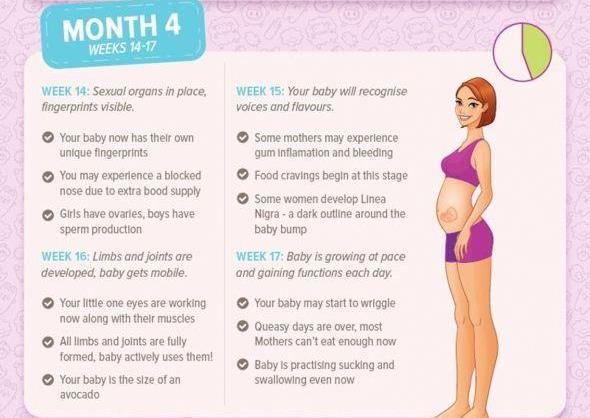

Everything You Need to Know About Being Four Months Pregnant
You're now in the second trimester! Congratulations. You're well on your way to having a healthy, bouncing baby. Let's talk about what's happening in your fourth month of pregnancy.
Key Points
- Your baby can move, swallow, kick, and hear your voice. You may start to feel your baby make its first movements during this month; if so, let your doctor know.
- Sometimes, the gender of the baby can be determined in this month.
- Your morning sickness should get better, but heartburn and constipation will remain.
Your Baby's Growth in Month Four
Your baby moves, kicks, swallows, and can hear your voice. The umbilical cord continues to grow and thicken to carry enough nourishment from mother to fetus. The placenta is now fully formed and functioning completely.
Your baby's hair begins to grow during this month. Sometimes, the gender of the baby can be determined in this month by looking at its external sex organs on an ultrasound. In biological males, the prostate gland will begin to form. In biological females, the ovaries move down from the abdomen to the pelvic area. Eggs will also begin to form in the ovaries.
By the end of month four, the fetus is six to seven inches long and weighs close to five ounces.
Your Body in Month Four of Pregnancy
Your appetite increases now as any morning sickness disappears. You begin to feel more energetic as you feel better. Toward the end of this month (16-20 weeks), you might feel the faint movement of your baby for the first time (called quickening); tell your doctor when you do. Your belly begins to show and you will probably have to start wearing maternity clothes and bigger bras this month.
While morning sickness will subside, heartburn and constipation remain. If either of these symptoms become severe or begin having a significantly detrimental effect on you, talk to your doctor. Your breasts may be sore, and darkening of the areolas will continue. You may experience shortness of breath or faster breathing; these are normal symptoms of pregnancy and are not a cause for concern.
You may experience bleeding gums, nosebleeds, or nasal stuffiness due to increased blood flow. All of these are normal, but talk to your doctor if they become especially problematic.
Prenatal Care During Your Fourth Month of Pregnancy
Visit your doctor or health care provider for your month four checkup. Pregnant women need extra iron, so your doctor may recommend iron supplements. Do not take any supplements without consulting your doctor. Taking supplements without a doctor's order can lead to you overdosing on them, which can cause a number of health problems. You'll probably gain about one pound a week, or 12 to 14 pounds, during your second trimester.
Make sure you're getting enough rest. If you're having trouble sleeping, consider investing in a pregnancy pillow. Make sure your room is kept dark and quiet. If you need a little noise to sleep well, invest in a white noise machine or run a box fan on low. If needed, buy a sleeping mask or blackout curtains to keep your sleeping environment dark. Try to maintain a regular bedtime routine.
Low-impact, low-intensity exercise is great for you and your baby. Walking is generally the best way to accomplish this. Talk to your doctor about how much you should be walking per day. Listen to your body as you exercise, and stop if it becomes painful or too tiring.
Keep your stress levels low as much as you can. Avoid unnecessary stress. Make sure you reserve time to do the things that you enjoy. Set boundaries with your relationships, and understand that it's okay to say no. If you find that your stress has become unmanageable, talk to a mental health professional.
If your health care provider recommends prenatal testing using amniocentesis, or alpha-fetoprotein (AFP) testing, for neural tube defects, it will be done at 16 to 18 weeks pregnant.
Do not take the content of this article as professional medical advice. It's important to exercise due diligence when obtaining relevant information in matters pertaining to your health. Always consult with your healthcare provider before making any medical decisions.